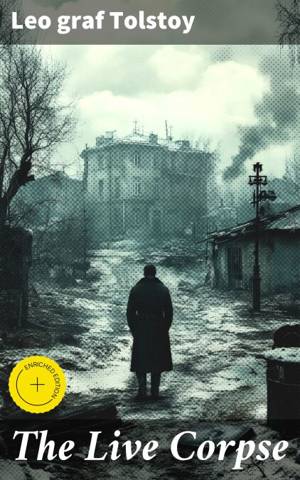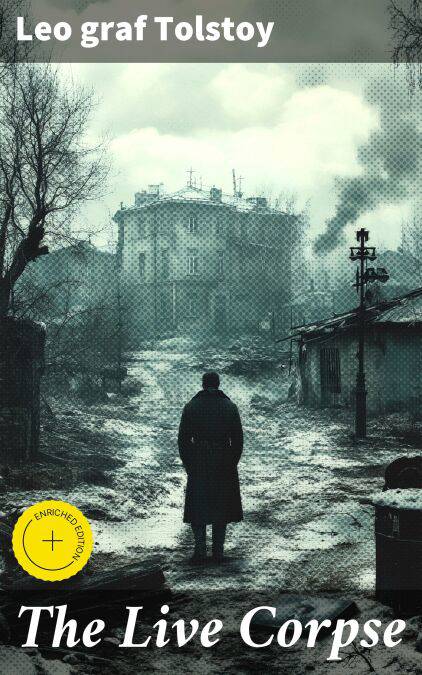
Je cadeautjes zeker op tijd in huis hebben voor de feestdagen? Kom langs in onze winkels en vind het perfecte geschenk!
- Afhalen na 1 uur in een winkel met voorraad
- Gratis thuislevering in België vanaf € 30
- Ruim aanbod met 7 miljoen producten
Je cadeautjes zeker op tijd in huis hebben voor de feestdagen? Kom langs in onze winkels en vind het perfecte geschenk!
- Afhalen na 1 uur in een winkel met voorraad
- Gratis thuislevering in België vanaf € 30
- Ruim aanbod met 7 miljoen producten
Zoeken
The Live Corpse E-BOOK
Enriched edition. A Psychological Journey through Russian Identity and Philosophical Reflections
Leo graf Tolstoy
E-book | Engels
€ 1,99
+ 1 punten
Omschrijving
In "The Live Corpse," Leo Tolstoy delves into the morally complex terrain of human relationships, societal expectations, and the search for authentic existence. This novella encapsulates Tolstoy's hallmark literary style, characterized by rich psychological insight and keen social critique. The narrative unfolds through the lens of a protagonist faced with an existential dilemma, illustrating the absurdity of a life deprived of genuine emotion, and poses profound questions about freedom and duty. Its publication during the late 19th century situates the work within a wave of Russian literature that wrestled with issues of realism and moral philosophy, while also reflecting Tolstoy's grappling with personal faith and his views on life and death. Leo Tolstoy, one of the most influential writers in world literature, is renowned for his exploration of ethical themes throughout his oeuvre. His experiences as a soldier, landowner, and seeker of spiritual truth deeply informed his writing. "The Live Corpse" is influenced by Tolstoy's own crises of faith and his observations about society's superficial morals, conveying his desire to provoke thought and inspire change in the reader's life. This novella is a compelling read for anyone interested in existential philosophy and the complexities of human morality. Tolstoy's incisive prose and provocative themes not only make for an engaging narrative but also challenge readers to reflect on their own lives and the authenticity of their emotional engagements.
In this enriched edition, we have carefully created added value for your reading experience:
- A succinct Introduction situates the work's timeless appeal and themes.
- The Synopsis outlines the central plot, highlighting key developments without spoiling critical twists.
- A detailed Historical Context immerses you in the era's events and influences that shaped the writing.
- An Author Biography reveals milestones in the author's life, illuminating the personal insights behind the text.
- A thorough Analysis dissects symbols, motifs, and character arcs to unearth underlying meanings.
- Reflection questions prompt you to engage personally with the work's messages, connecting them to modern life.
- Hand‐picked Memorable Quotes shine a spotlight on moments of literary brilliance.
- Interactive footnotes clarify unusual references, historical allusions, and archaic phrases for an effortless, more informed read.
In this enriched edition, we have carefully created added value for your reading experience:
- A succinct Introduction situates the work's timeless appeal and themes.
- The Synopsis outlines the central plot, highlighting key developments without spoiling critical twists.
- A detailed Historical Context immerses you in the era's events and influences that shaped the writing.
- An Author Biography reveals milestones in the author's life, illuminating the personal insights behind the text.
- A thorough Analysis dissects symbols, motifs, and character arcs to unearth underlying meanings.
- Reflection questions prompt you to engage personally with the work's messages, connecting them to modern life.
- Hand‐picked Memorable Quotes shine a spotlight on moments of literary brilliance.
- Interactive footnotes clarify unusual references, historical allusions, and archaic phrases for an effortless, more informed read.
Specificaties
Betrokkenen
- Auteur(s):
- Vertaler(s):
- Uitgeverij:
Inhoud
- Aantal bladzijden:
- 141
- Taal:
- Engels
Eigenschappen
- Productcode (EAN):
- 4057664611888
- Verschijningsdatum:
- 26/11/2019
- Uitvoering:
- E-book
- Beveiligd met:
- Digital watermarking
- Formaat:
- ePub

Alleen bij Standaard Boekhandel
+ 1 punten op je klantenkaart van Standaard Boekhandel
Beoordelingen
We publiceren alleen reviews die voldoen aan de voorwaarden voor reviews. Bekijk onze voorwaarden voor reviews.









